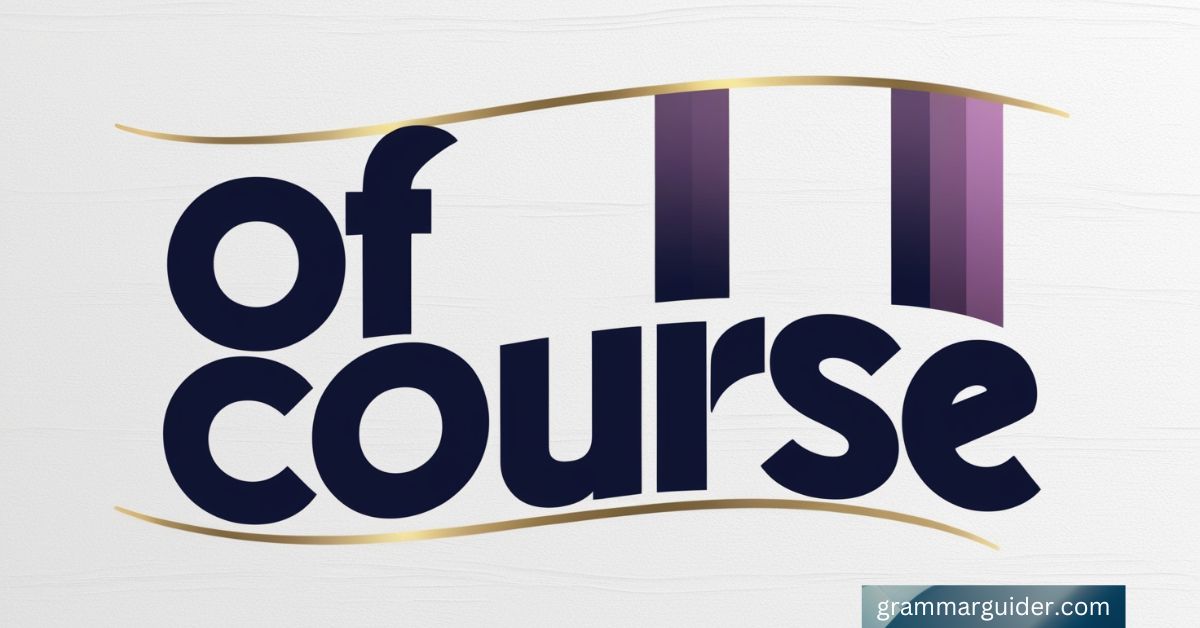The English language is filled with nuanced spelling rules, and some of the most common questions arise over seemingly simple phrases. One of the most confusing is whether to use “of course” or “ofcourse.” Is it one word or two? Does the phrase change its meaning depending on how it’s spelled?
Let’s explore this confusion and clear up all your doubts about the correct usage, spelling, and meaning of both “of course” and “ofcourse.”
What Does “Of Course” Mean?
Before diving into the spelling debate, it’s essential to understand what “of course” actually means. This phrase is commonly used to express agreement, certainty, or something that is obvious or expected. It can be used in many situations, both formal and informal.
For instance, when someone asks you a question, and you want to confirm something in a positive, reassuring way, you might say:
- “Yes, of course, I can help you with that!”
This confirms that you’re happy and willing to help. It’s an easy way to affirm a statement or response.
In another scenario, if you are talking about something that is obvious, you could say:
- “Of course, we need to finish the report before the deadline.”
It’s clear that finishing the report is expected, so “of course” implies that it’s a no-brainer.
The Confusion: “Ofcourse” vs. “Of Course”
Is “Ofcourse” a Correct Spelling?
Many people often wonder: “Is of course one word or two?” The confusion largely stems from the mistaken belief that “ofcourse” is an accepted spelling. However, the correct spelling is “of course” as two separate words.
According to standard English usage, “ofcourse” is not a valid spelling. This is why you will rarely, if ever, see “ofcourse” used in reputable writing, such as books, articles, or even emails. The Oxford Dictionary confirms that “of course” should be written as two words.
Common Mistakes with “Ofcourse”
It’s easy to slip into using “ofcourse” because it sounds natural in spoken language. However, you should avoid it in formal writing, emails, and professional contexts. Here’s a simple example:
- Incorrect: “I’ll attend the meeting, ofcourse.”
- Correct: “I’ll attend the meeting, of course.”
Notice how the corrected version uses two words: “of” and “course,” which is the grammatically correct structure.
Examples of “Of Course” in Different Scenarios

To better illustrate the correct usage of “of course”, let’s look at a few common scenarios where you might use this phrase.
Scenario 1: In a Professional Email
Imagine you are replying to a client named Mr. Johnson, who has asked for confirmation of an upcoming appointment. Here’s how you might use “of course” in a polite, professional tone:
Subject: Confirmation of Appointment
Dear Mr. Johnson,
Thank you for your email. Of course, I will be available at 10 AM on Thursday, as scheduled. If you have any further questions or need to adjust the time, please let me know.
Best regards,
[Your Name]
In this scenario, “of course” confirms the scheduled appointment in a clear and positive manner.
Scenario 2: Informal Text Message
Now, let’s look at how “of course” might appear in a more casual context, like texting a friend:
Friend: “Hey, are you coming to the party tonight?”
You: “Yes, of course! I wouldn’t miss it!”
Here, “of course” is used to convey enthusiasm and certainty about attending the event.
Why You Should Avoid Using “Ofcourse”
While you might see “ofcourse” used occasionally on social media or in informal communication, it’s important to remember that this is not the correct spelling. Using “ofcourse” in professional writing could damage your credibility, especially if your audience expects formal language.
Ofcourse spelling meaning could also be confusing. If you use the incorrect version, you might unintentionally confuse readers, leading them to question your attention to detail or knowledge of grammar.
The Pronunciation of “Of Course”
Whether you write it as two words or mistakenly as “ofcourse”, the pronunciation remains the same. It’s pronounced /ʌv kɔːrs/, which sounds just like “uhv kaws”.
There’s no difference in the way you would say the phrase, so when speaking, it doesn’t matter if you’re using “of course” or the incorrect “ofcourse” in conversation. However, in writing, always stick with the correct two-word form.
A Helpful Table: Key Differences Between “Of Course” and “Ofcourse”
Here’s a simple breakdown to summarize the differences between the correct “of course” and the incorrect “ofcourse.”
| Feature | Of Course | Ofcourse |
|---|---|---|
| Spelling | Correct | Incorrect |
| Pronunciation | /ʌv kɔːrs/ | /ʌv kɔːrs/ |
| Meaning | Used to express certainty, agreement, or something obvious. | No standard meaning in English. |
| Usage | Professional, casual, written, and spoken contexts. | Avoid in professional writing. |
| Grammatical Status | Accepted by Oxford and other dictionaries. | Not accepted in formal contexts. |
Of Course in Other Languages
Let’s briefly explore how “of course” translates into other languages, which may give you a better understanding of its meaning in different contexts.
- Of course meaning in Urdu: In Urdu, “of course” is often translated as “یقیناً” (Yaqeenan), which is used to express certainty.
- Ofcourse meaning in Hindi: In Hindi, “of course” translates to “बिल्कुल” (Bilkul), indicating something obvious or certain.
- Ofcourse in Tagalog: In Tagalog, “of course” can be translated as “syempre” (pronounced shemp-reh), used in similar contexts as in English.
- Of course แปลว่า: In Thai, “of course” translates to “แน่นอน” (naenon), which similarly indicates certainty.
Does “Of Course” Have Multiple Meanings?
Indeed, “of course” can have different meanings depending on the context, but it always carries a sense of affirmation or obviousness. Let’s look at a few examples:
Example 1: Of Course Not
In some situations, “of course” can take a negative form, such as “of course not.” Here’s how it might look in an email exchange:
Client: “Do you think we can finish the project by tomorrow?”
You: “No, of course not! The project requires more time to complete.”
In this case, “of course not” indicates that something is not obvious or expected.
Example 2: Of Course, You Are
This is another common usage that emphasizes certainty, typically used in conversation or text messages. For example:
Friend: “Do you think I look good in this outfit?”
You: “Of course, you are always stylish!”
Here, “of course” adds emphasis to affirm your friend’s appearance in a positive way.
Final Thoughts: Use “Of Course” Correctly
It’s clear that “of course” should be written as two words, not “ofcourse.” Whether you’re writing an email, text message, or formal document, always remember to keep it separate. This small detail can make a significant difference in how your writing is perceived.
By understanding the meaning, pronunciation, and usage of “of course”, you’ll be able to communicate more effectively and confidently. Keep practicing, and you’ll never mix up “ofcourse” with “of course” again!

Harley Rose is a seasoned expert in English grammar and writing tips, blending years of knowledge and a love for language into her work. With a sharp eye for detail and a talent for making grammar accessible, Harley shares practical insights that help readers write with precision and flair. Her content is ideal for anyone looking to strengthen their writing skills and express themselves with confidence.

